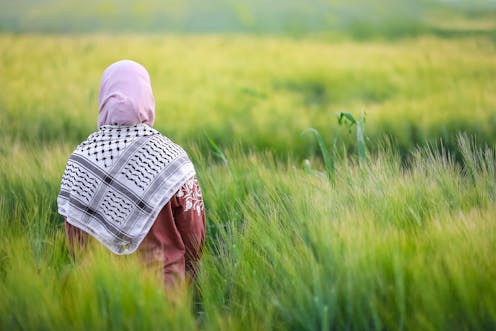Sara M. Saleh's memorable tales of exile, prejudice and resistance reflect the Palestinian experience
- Written by Michelle Hamadache, Lecturer, Literature and Creative Writing, Macquarie University

Sara M. Saleh[1] is a writer and human rights lawyer. She has won two of Australia’s most prestigious poetry prizes: Overland’s Judith Wright Poetry Prize[2] in 2020 and Australian Book Review’s Peter Porter Poetry Prize [3] in 2021. She has published extensively in literary and poetry journals, and co-edited Arab, Australian, Other: Stories on Race and Identity[4] with Randa Abdel-Fattah.
Review: Songs for the Dead and the Living – Sara M. Saleh (Affirm Press) & The Flirtations of Girls/Ghazal el-Banat – Sara M. Saleh (University of Queensland Press)
Saleh has recently published her second full-length collection of poems, The Flirtations of Girls/Ghazal el-Banat[5] (she self-published Wasting the Milk in Summer[6] in 2016), and her first novel, Songs for the Dead and the Living[7].
The Flirtations of Girls/Ghazal el-Banat is a rich collection filled with anger, sorrow, beauty, attitude, wit and humour. Songs for the Dead and the Living is a coming-of-age story, kaleidoscopic in its formal and tonal variation, about a young girl named Jamilah Husseini and her family, spanning three countries: Lebanon, Egypt and Australia.
Palestine is ever-present in both books, which are marked by the enduring effects of the Nakba[8] of 1948, the continued struggle to exist in the shadow of Israel, and the impact of exile and prejudice on Palestinian people forced to flee their homeland.
Saleh’s gaze is unflinching. In her prose and her poetry, she renders unique and memorable the ways people resist, transcend, adapt, make the best of things, compromise, endure, lose hope and faith – and sometimes become something other than they might have been.
Read more: The Nakba: how the Palestinians were expelled from Israel[9]
Poetics of exile
In The Flirtations of Girls/Ghazal el-Banat, Saleh depicts bodies and places as sites of division, violence, plurality, opportunity and negation. Her poetics are attuned to the price paid by migrants for leaving their homelands. The final lines of her poem You, An Effigy are:
Nobody told youthe cost of entering was losing your way back.
Like many of Saleh’s poems, You, An Effigy is formally inventive, assured and subversive. The “effigy” of the title – a woman who must figuratively burn – desires a home. Sensual and sexual, she wants to be held. But she is ultimately isolated on a shabby, sterile street not hard to recognise as Sydney. The poem transforms the woman from an object of sexual violence to an abrasive speaking subject who defies expectations.

















